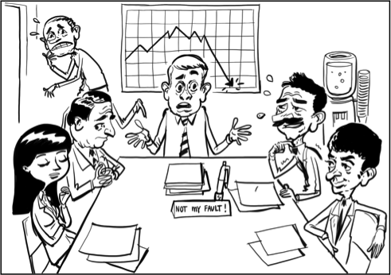 There has never been a time when more things have been changing at once in the world of B2B selling. Solutions are becoming more complex. Products and services look increasingly similar and customers struggle to see the differences. More stakeholders are involved in buying decisions. Customers want to spend less time in face to face meetings with vendors. And many organisations are cutting the size of the sales team while at the same time raising targets.
There has never been a time when more things have been changing at once in the world of B2B selling. Solutions are becoming more complex. Products and services look increasingly similar and customers struggle to see the differences. More stakeholders are involved in buying decisions. Customers want to spend less time in face to face meetings with vendors. And many organisations are cutting the size of the sales team while at the same time raising targets.
In this environment, Sales People need to continuously improve the way they sell. One of our clients in the software industry has simultaneously raised the target for the sales team by 15% and cut the size of the team by 25%! They can’t achieve this by just working harder – they have to work smarter.
I think the key to working smarter is critical self-reflection. But Managers have to make self-reflection a positive. Unfortunately many don’t.
The self-reflection mirror is often broken
I ran a workshop recently in which I asked all the Sales People in the room to identify the reasons behind recent losses. They kept coming up with reasons but they took 14 minutes before anyone suggested that any lost sale might have been the result of poor selling. Everything about price, service, product and the competition was to blame but never anything the sales team had done.
I had a similar experience at another company that manufactures plumbing equipment like taps and shower-heads and sells them to the trade. The training went really well and all the Sales People were enthusiastic. But, when I followed up a couple of months later I was told they were still coming back and asking for discounts just like the bad old days. Why?
Perhaps the customers had learned in the past that asking for discounts works? But I think the real problem was that the Sales People hadn’t taken on board the idea that the way they were selling needed to change, so they went back to blaming the price. They were not willing to critically reflect on themselves.
It is tough getting the balance right. To be a good Sales Person you have to have a lot of self-confidence, but to continuously become better you need to be self-critical. If you are not self-critical you won’t see where you could have done better and you will never improve. And Sales People who don’t improve will rapidly get left behind.
Too often, Managers prevent critical self-reflection
When it came to the coffee break in the first example above one of the Sales People took me aside and said, “You know why nobody said there was a problem with the way they sell. If you admit you have made a mistake in this place, that’s it. Game over. Your career here is at an end.” How on earth can an organisation hope to change for the better if making mistakes is punished?
Value self criticism
If an organisation does not allow, in fact value, self-criticism then it can never hope to change and improve. My experience is that it’s the people who are doing really well already who are best at changing the way they work. I think that’s because they are motivated to do a good job and understand that examining their own performance is the only way to improve.
But the majority of Sales People need encouragement to become and stay self-reflective. Managers have to coach Sales People to examine every loss, to see what they could have done better. That way the weaknesses can be identified and improvements can be made.
Once the areas for improvement have been identified the organisation can invest in training to fix them. But Managers have to coach their team to make the changes stick. Anyone who has ever quit smoking, stuck to a diet or taken up a fitness programme will know that making changes and sticking with them is tough.
What can individuals and organisations do to change for the better?
The organisation can do a lot, but ultimately it’s the responsibility of the Sales Person to systematically reflect on their performance and change the way they work. All very well in theory, but here are a few practical points, starting with the organisations responsibilities.
-
Create a positive culture - any hint of a blame culture has to be done away with and instead, Sales People should be encouraged to look at every sale and acknowledge where they could have done better. Even wins should be examined, for instance to see if a decent profit has been retained in the deal.
-
Share good practice – it helps the whole team to discover new ways to do a great job of selling. And I find that Sales People enjoy the competitive element of talking about their successes. Face-to-face sales meetings are best for this but even a conference call works well.
-
Provide training and coaching – whenever you discover a need for improvement provide relevant training and ensure managers are trained to support the change. Tackling one thing at a time helps to incrementally generate a feeling of success.
-
Make follow-up a mandatory part of the Sales Process – Our research shows just how few vendors do a thorough follow-up of wins and losses. Wins should be followed up to find out why you won the business and to ask for recommendations of course. Losses have even greater potential for learning, but only if you ask good questions, we talked more about this in an earlier blog titled “Turning a loss into a win for you”.
-
Build a picture of what your customers expect – use these follow-ups to develop a detailed picture of how your customers define good selling. Over time you can build up a persona, or a series of personas, and match the way you sell to the roles in your market.
-
Become self-reflective – this is for the individual not the organisation. You need self-confidence and a thick skin to go into a loss interview with a customer. But, unless you have the capacity to reflect on what you might have done better and improve next time you will never improve.
Ying and Yang
Organisations want success, but they have to value failure as a learning opportunity. Sales People have to have a lot of self-confidence throughout the Sales Process but need to look at what they could have done better at the end. Organisations can create the culture and give Sales People the tools to improve but ultimately it’s down to the individual Sales Person to continuously work on their skills and adapt in a fast changing world.
Your time to self-reflect
-
Does the culture in your organisation support self-reflection and self- criticism?
-
When was the last time you really looked at the way you work and found things you thought you could improve?
-
Have you got a plan to adapt the way you sell to the changes in your market?
Score yourself against 20 Success Factors with our B2B Selling Health Check:

